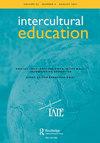情感在多元文化课堂中对寻求庇护儿童和难民儿童的教育工作中的作用
IF 0.8
Q3 EDUCATION & EDUCATIONAL RESEARCH
引用次数: 0
摘要
摘要本文通过研究多元文化课堂教学的具体案例,探讨情感在寻求庇护儿童和难民儿童教育工作中的作用。利用来自丹麦各种课堂环境的经验数据,基于教师访谈和参与者观察,情绪的作用通过关系方法进行检验,其中包括Sara Ahmed。该分析首先开发了三种类型的情境情绪管理,由演员执行的原因广泛,感觉规则和组织规则。其次,我对分析进行了理论解释,包括对情绪的研究,“情绪做什么”和“情绪如何运作”,以形成和塑造他人的身体。研究结果表明,情感的关系方法可以更好地理解情感如何在寻求庇护和难民儿童的教育工作中发挥作用,因此,教师如何受益于将这种方法纳入理解和寻找情感在寻求庇护和难民教育中发挥的重要作用的解决方案。本文章由计算机程序翻译,如有差异,请以英文原文为准。
The role of emotions in educational work with asylum-seeking and refugee children in culturally diverse classrooms
ABSTRACT This article examines the role of emotions in educational work with asylum-seeking and refugee children by studying a specific case of teaching in culturally diverse classrooms. Using empirical data from various classroom contexts in Denmark based on teacher interviews and participant observations, the role of emotions is examined through a relational approach informed by, among others, Sara Ahmed. The analysis firstly developed three types of situated emotion management performed by actors for a wide range of reasons, feeling rules and organisational regulations. Secondly, I undertook a theoretical interpretation of the analysis involving a study of emotions asking, ‘what do emotions do’ and ‘how do emotions operate’ to make and shape bodies of othering. The findings suggest that a relational approach to emotion allows for a better understanding of how emotions work with effect in educational work with asylum-seeking and refugee children and, accordingly, how teachers can benefit from including this approach in understanding and finding solutions to the important role emotions play in asylum-seeking and refugee education.
求助全文
通过发布文献求助,成功后即可免费获取论文全文。
去求助
来源期刊

Intercultural Education
EDUCATION & EDUCATIONAL RESEARCH-
CiteScore
2.30
自引率
8.30%
发文量
36
期刊介绍:
Intercultural Education is a global forum for the analysis of issues dealing with education in plural societies. It provides educational professionals with the knowledge and information that can assist them in contributing to the critical analysis and the implementation of intercultural education. Topics covered include: terminological issues, education and multicultural society today, intercultural communication, human rights and anti-racist education, pluralism and diversity in a democratic frame work, pluralism in post-communist and in post-colonial countries, migration and indigenous minority issues, refugee issues, language policy issues, curriculum and classroom organisation, and school development.
 求助内容:
求助内容: 应助结果提醒方式:
应助结果提醒方式:


